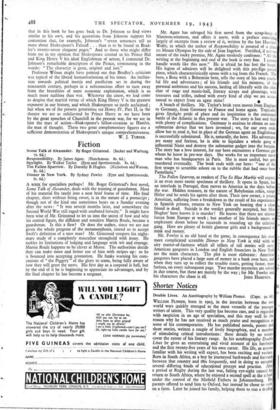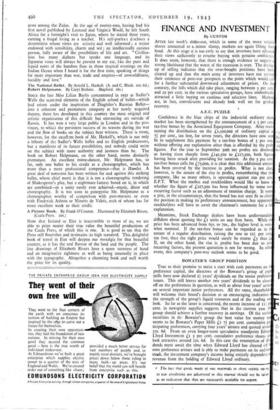Shorter Notices
Double Lives. An Autobiography by William Plomer. (Cape. 95. 6d.) WILLIAM PLOMER, born in 1903, in the interim between the two world wars quickly emerged as the most versatile of the younger writers of talent. This very quality has become rare, and is regarded with suspicion in an age of specialists, and this may well be the reason why he has not received as much praise and recognition as some of his contemporaries. He has published novels, poems and short stories, written a couple of lively biographies, and a number of stimulating critical introductions : these details by no means cover the extent of his literary range. In his autobiography Double Lives he gives an entertaining and vivid account of his forebears and the first twenty-five years of his own career. His life, as anyone familiar with his writing will expect, has been exciting and various. Born in South Africa, as a boy he journeyed backwards and forwards between that country and this frequently, and in doing so sampled several differing kinds of educational precept and practice. After a period at Rugby during the last war, failing eye-sight caused his return to South Africa, where he enjoyed a second spell at the school under the control of the Mirfield Fathers in Johannesburg. His parents offered to send him to Oxford, but instead he chose to work on a farm. Later he joined his family, helping them to run a trading
store among the-Zulus. At the age of twenty-two, having had his first novel published by Leonard and Virginia Woolf, he left South Africa for a fortnight's visit to Japan, where he stayed three years, earning a frugal living as a teacher. His self-portrait d.scloses a determinist whose views aye eclectic and well informed ; a writer endowed with sensibility, charm and wit ; an intellectually curious person, fully aware of the possibilities of life and art. " Civilisa- tion has many dialects but speaks one language, and its Japanese voice will always be present to my ear, like the pure and liquid notes of the bamboo flute in those tropical evenings on the Indian Ocean when I heard it for the first time, speaking of things far more important than war, trade and empires—of unworldliness, lucidity and love."



























 Previous page
Previous page